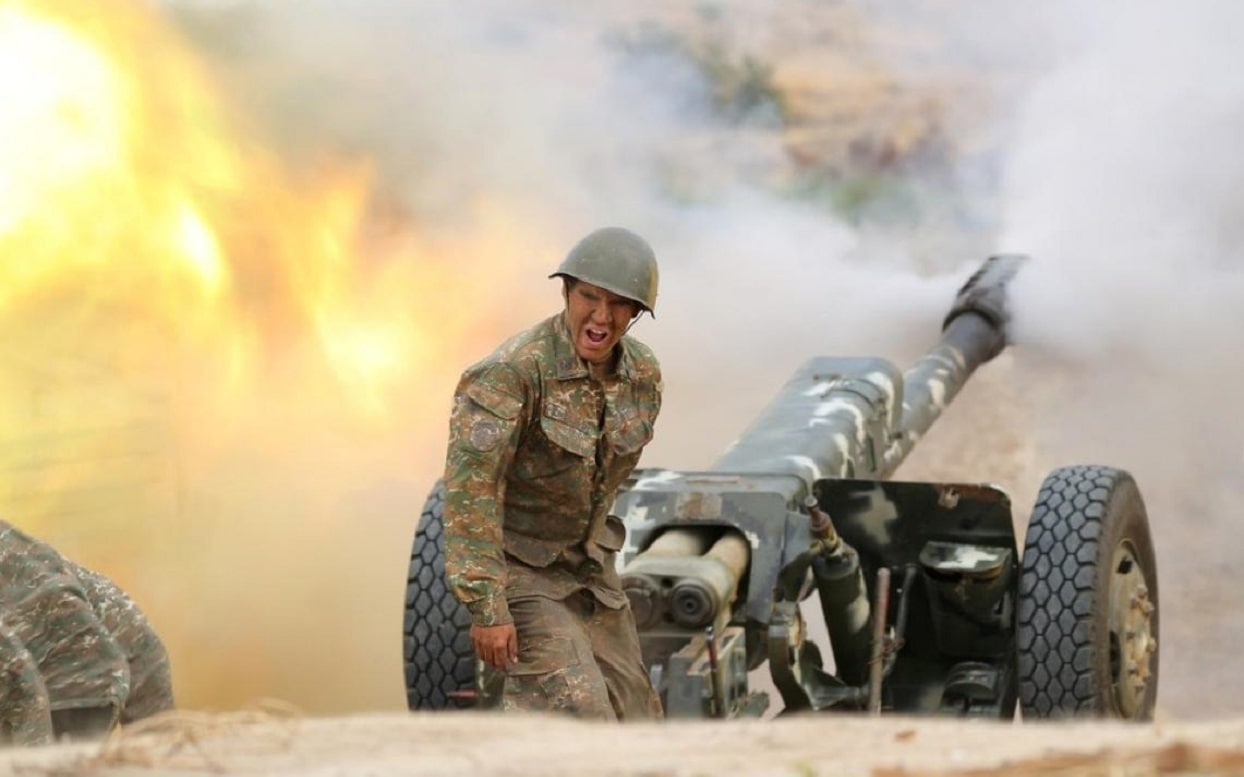Azerbaijan’s siege of the Artsakh is almost seven weeks old. Even a State Department prone to bothsiderism now recognizes that Azerbaijan alone is responsible for the blockade of the self-declared Armenian state in Nagorno-Karabakh.
Those who seek to align U.S. policy more closely with Azerbaijan first questioned the existence of any blockade. The point is moot now, so their rhetoric has shifted. No longer does anyone outside Azerbaijan suggest the so-called eco-activists blocking the region’s lifeline road are anything but Azerbaijani irregulars. Nor does anyone but the most ardent génocidiares question the suffering to which Azerbaijani President Ilham Aliyev subjects a population that he ironically says is his own.
Artsakh Is the Opposite of a Satrapy
In order to rally Western opinion against Armenians in Nagorno-Karabakh, Azerbaijani talking points describe Artsakh as a Russian puppet state planted at the heart of the Caucasus. There is a certain irony to this as Aliyev, much like Turkish President Recep Tayyip Erdogan, has shifted closer to Russia, if only to play Washington and the Kremlin off each other. Indeed, Aliyev was the first leader to embrace Putin just days after Russia’s invasion of Ukraine. At the same time, Armenia has drifted farther from Russia’s embrace. Armenian Prime Minister Nikol Pashinyan, for example, shut down military exercises with Russia and sabotaged a Collective Security Treaty Organization signing ceremony in Yerevan.
Many of Armenia and Artsakh’s loudest critics in Washington have never visited either place. I have traveled to both Yerevan and Baku, as well as to the Artsakh capital Stepanakert, in order to compare and fact-check narratives, and to immunize myself from the polemical descriptions typical to the dispute. Bottom line up front: It is silly to suggest Artsakh is a Russian satrapy.
First, Artsakh has a history that predates Putin or the artificial proxies he has sought to carve out from his neighbors’ territory. Second, Artsakh is an established democracy, if also an imperfect one. Freedom House ranks the unrecognized state as “partly free.” In contrast, not only does it rank Azerbaijan as “not free,” but lists the country even lower than Russia, and on par with the military junta in Myanmar. Armenia, meanwhile, continues to advance its democracy. Russia imposes a model on its allies that is incompatible with democracy. The Baltic states, Georgia, Ukraine, and now Armenia and Artsakh fell out with Moscow precisely because they embraced democracy and sought to break away from Russia’s political domination.
Questionable Rewards
Ironically, Artsakh critics now seek to use the unrecognized state’s democracy as proof that it is a Russian satrapy. Artsakh is a parliamentary republic. While the president is the head of state, constitutional revisions in 2017 replaced the prime minister with a state minister appointed by the president. In September 2022, President Arayik Harutyunyan appointed Ruben Vardanyan as state minister, and the arguments about Artsakh’s submission to Moscow pivot around Vardanyan’s involvement. For example, the Hudson Institute’s Michael Doran tweeted that Vardanyan “is a Russian oligarch whom Putin virtually dispatched to Karabakh.”
Vardanyan, however, is Armenian. He was born in Yerevan and his grandmother hails from Artsakh. While Vardanyan held dual citizenship, he revoked his Russian citizenship, pointing to the looming threat of genocide represented by Azerbaijan’s move to crush Nagorno-Karabakh’s Armenian community. Vardanyan has a long history of connection to Nagorno-Karabakh. While the children of other billionaires in Russia vacationed on the French Riviera or Turkey’s Mediterranean Coast and avoided military service, Armenians tell me that about a decade ago, Vardanyan’s son did his military service in Nagorno-Karabakh. Vardanyan himself had previously moved back to Armenia, but decided to relocate to Nagorno-Karabakh because he thought its needs to be greater.
If Vardanyan was really Moscow’s man, why would Putin reward him with no food, no gas, no electricity, no internet and a continuing blockade?
Nor is it accurate to dismiss Vardanyan as just another corrupt oligarch. He made much of his fortune before Putinism and crony capitalism eviscerated the economy. His Troika Dialog succeeded precisely because it was the most transparent brokerage and investment firm in the region. While the Organized Crime and Corruption Reporting Project once accused Vardanyan of complicity in money laundering, they now appear to have exonerated him.
Azerbaijan may claim Artsakh as entirely its own, but international law is not so clear. It is ironic that those most prone to dismiss Artsakh as a Russian proxy are the same voices who seek to affirm Joseph Stalin’s ethnic gerrymandering.
MORE: Why Putin Fears the M1 Abrams Tank
MORE: I Went to War in the Leopard 2 Tank Ukraine Wants
MORE: World War III – Where Could It Start?
MORE: A U.S.-China War Over Taiwan Would Be Bloody
The situation on the ground today is clear. Artsakh is under siege, and Azerbaijan is the aggressor. No effort to distract with calumnies against Armenians changes that. U.S. law is also clear. If Azerbaijan seeks a military solution to a diplomatic dispute, under Section 907 of the Freedom Support Act, it should receive no American assistance. That the White House continues to defy U.S. law and Congressional intent is a political scandal, morally obtuse, and undercuts American national security.
Opinion Author Biography: Now a 1945 Contributing Editor, Dr. Michael Rubin is a Senior Fellow at the American Enterprise Institute (AEI). Dr. Rubin is the author, coauthor, and coeditor of several books exploring diplomacy, Iranian history, Arab culture, Kurdish studies, and Shi’ite politics, including “Seven Pillars: What Really Causes Instability in the Middle East?” (AEI Press, 2019); “Kurdistan Rising” (AEI Press, 2016); “Dancing with the Devil: The Perils of Engaging Rogue Regimes” (Encounter Books, 2014); and “Eternal Iran: Continuity and Chaos” (Palgrave, 2005).

